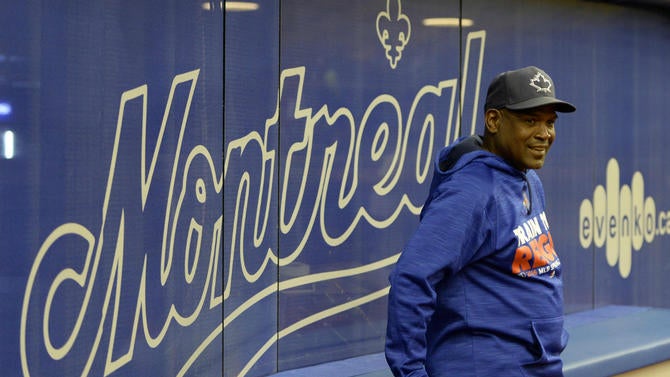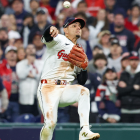To: Baseball Hall of Fame Voters
Re: Tim Raines
From: Jonah Keri
Hello BBWAA voter! I hope this letter finds you well.
I'm writing today on behalf of Tim Raines' candidacy for the Baseball Hall of Fame. Since you didn't vote for Raines on last year's ballot, I would like to take a few moments to make the case for him this year, in the hopes that you'll consider voting for him this time around.
Let's start with this premise: Barring extenuating circumstances, racking up 3,000 hits has historically guaranteed induction into the Hall of Fame. Every member of the 3,000-hit club, save for the ineligible Pete Rose, players linked to performance-enhancing drugs and two not-yet-eligible players (Derek Jeter and Ichiro Suzuki), is in.
Tim Raines ended his career with 2,605 hits.
There's no guarantee he would have garnered an avalanche of additional votes if he had reached 3,000. But given what we know about voting precedents and the power of round numbers, it's safe to say that his candidacy would be viewed in a different light if he had managed to bang out those 395 additional hits.
There's an old expression in baseball, one that we start hearing from the earliest days of Little League: A walk is as good as a hit. This isn't always true, of course. Context matters. Leading off an inning, there's no practical difference between a walk and a single, whereas with runners on base, the value of a single is often higher.
Still, take every walk and every single, account for all situations, and it's reasonable to say that there isn't a huge difference between the two outcomes. Getting on base matters more than how a player got there.
Change the currency from hits to times on base, and the conversation changes. Raines reached base 3,977 times in his career. That's more than Hall of Famers Tony Gwynn, Lou Brock, Roberto Clemente, Mike Schmidt, Roberto Alomar, Eddie Mathews, Brooks Robinson and Harmon Killebrew. If you evaluate no other part of his résumé, that alone makes Raines a strong Hall of Fame candidate.
Of course, that isn't his entire résumé. Not by a long shot.

Through the course of baseball history, only five players have ever stolen 800 or more bases. The first four -- Rickey Henderson, Lou Brock, 19th-century star Billy Hamilton and Ty Cobb -- are all in the Hall. Raines is the only one who isn't.
He was a terror on the basepaths from day one. The first 27 times Raines tried to steal a base in the big leagues, he slid in safely. His 1981 rookie season was marred by a midseason strike that cancelled games for two months. Too bad. When players left the field after the games of June 11 to go on strike, Raines had swiped an unfathomable 50 bases in the first 54 games of that season. One account of that year described pitchers and catchers league-wide crying for joy the first time Raines got thrown out; at least then, they could confirm he was human.
If Raines ran with reckless abandon, you could understand dismissing that lofty stolen-base total. After all, trying to steal bases doesn't help your team all that much if you're just running at will, and getting thrown out a lot. But here's the thing about Raines: That streak of 27 straight successful attempts to start his career foreshadowed what he would go on to do for 23 seasons. He stole 808 bases in his career, and was caught just 146 times. That's an 84.7 percent success rate, the highest mark in baseball history for anyone with 400 or more tries.
Those hitting and baserunning feats put Raines right in step with an illustrious list of Hall of Famers. Still, the Hall is a place that should reward the greatest players in baseball history, so we want to acknowledge the players who ranked among the very best of their era.
Let's do that now. For the five-year period spanning 1983 through 1987, the best player in the National League by Wins Above Replacement wasn't Mike Schmidt, Dale Murphy, Andre Dawson, Gary Carter, Tony Gwynn, Ozzie Smith or Ryne Sandberg. It was Tim Raines.
During that half-decade, Raines batted .318/.406/.467, an offensive line 43 percent better than league average. He stole 355 bases over that span, an average of 71 per season that led the NL. He also swiped them at an 88 percent success rate, tops in the NL for anyone with anywhere near as many attempts. If you're a fan of team-dependent counting stats, Raines crushed all comers there too: He scored 568 runs in those five seasons, an average of just under 114 per year, also tops in the National League.
We don't have to stop at five years to gauge Raines' dominance. From 1981 to 1990, a decade-long span covering the first 10 full seasons of Raines' career, the best player in the National League by Wins Above Replacement was ... Tim Raines. Combine that decade of dominance with a strong career tail that included two World Series titles with the Yankees, and you have a player whose résumé is, by historical standards, Hall of Fame-worthy.
That's not a matter of conjecture -- it's a statement of historical fact. Baseball-Reference and Sports Illustrated writer Jay Jaffe track a metric called JAWS, which measures how a player stacks up to players already in the Hall of Fame. The idea behind JAWS is simple: If you're going to vote for a player's induction, better to raise the Hall's standards than to lower them. If a player's résumé shows up as better than at least half of the Hall's 217 enshrined major-league legends, that's raising the bar. JAWS undertakes this task by comparing each player on the Hall of Fame ballot with all Hall of Famers who played the same position.
A total of 19 left fielders have been inducted into the Hall of Fame. Induct Raines and you're voting in a player who would become the sixth-greatest left fielder to ever be immortalized in Cooperstown. By one objective measure after another after another, considering both traditional and advanced stats, you are raising the bar.
As you know, this is Raines' 10th and final appearance on the Hall of Fame ballot. Supporting his candidacy honors one of the greatest leadoff hitters of all time, a player admired, feared and revered by both the leading baseball minds and top players of his era. Asked to assess Raines' skill during the speedster's monstrous 1984 campaign (.309 average, .393 on-base percentage, 106 runs scored, 75 steals), no less an authority than Pete Rose didn't mince words: "Right now he's the best player in the National League," Rose told SI's Ron Fimrite. "Mike Schmidt is a tremendous player and so are Dale Murphy and Andre Dawson, but Rock can beat you in more ways than any other player in the league."
I hope that this note will help nudge you toward voting for Raines. If you would like more information that can help guide your decision, or just want to discuss, I would be very happy to do so.
Thanks for your consideration!
Jonah

















